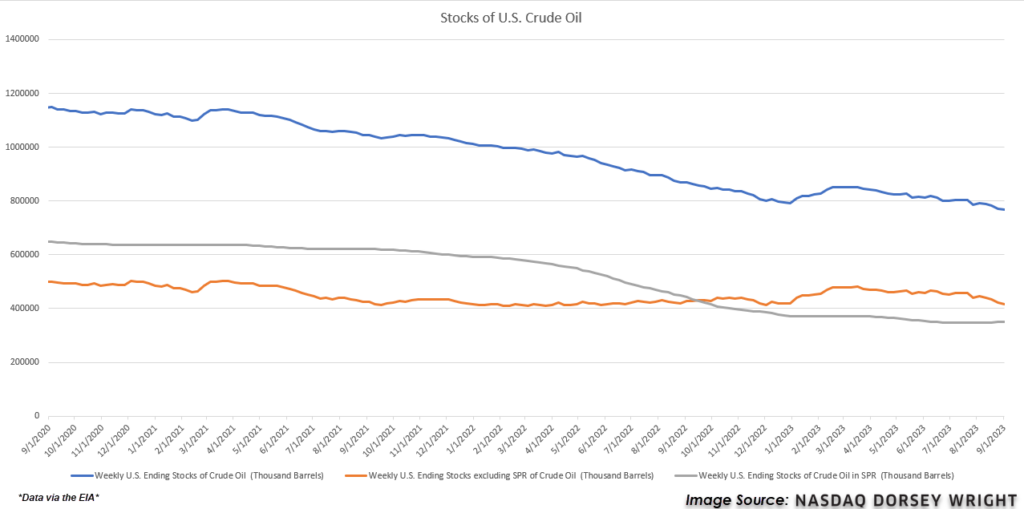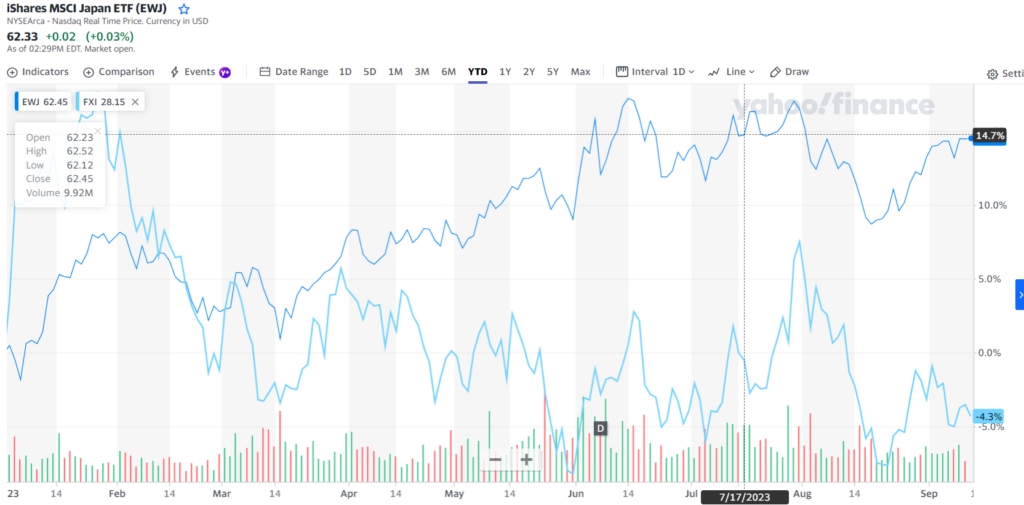1. Two Break-Out Charts…10 Year Treasury and Energy SPDR

XLE energy etf

2. Gasoline Prices Hit Resistance for at these Levels for Last 12 Months

3. Shrinking Stock of Crude Oil Reserves
Nasdaq Dorsey Wright

4. T-Bills…Retail Buys $1 Trillion of New Notes in Three Months
Bloomberg-With rates on cash and cash-like instruments at the highest in more than two decades and offering more income than benchmark US debt or stocks, assets in money-market funds have swelled to a record. But nowhere is that appetite for liquid, high-yielding instruments more apparent than in the market for T-bills where investors have snapped up more than $1 trillion of new notes in just the last three months.

https://finance.yahoo.com/news/treasury-bills-yielding-5-big-110000346.html
5. Japan ETF vs. China ETF

6. Japan +15% vs. China -4.3% YTD

7. U.S. Direct Investment in China
From Dave Lutz Jones Trading

8. First-Time Homebuyers are 32% of Net Sales

9. Depopulation of Italy…Number of Deaths Exceeding Births
For the first time, the number of births in a year fell below 400,000 – representing an average of 1.25 babies per woman, according to official figures for 2022.
This means that the replacement rate is now negative, since the number of deaths currently exceeds the number of births – 12 deaths for every seven births.
https://www.cnn.com/2023/05/17/europe/italy-record-low-birth-rate-intl-cmd/index.html

10. 5 Mental Habits That Limit Our Ability to Think Wisely
Guy Winch Ph.D. Psychology Today
Our brain is like a computer processor: It has a finite amount of processing power, or intellectual resources, that can be used in a given moment. Any competing task (or emotional state) that occupies too much of our intellectual firepower impacts our ability to concentrate, focus, problem-solve, be creative, or use other cognitive abilities; as a result, our functioning IQ is temporarily lowered.
To demonstrate this principle, try walking while counting down from 1,000 by sevens (1,000, 993, 986, etc.). You will soon stop walking. Why? Your brain has to work so hard to do this math that it doesn’t have enough resources left to tell your legs to put one foot in front of the other.
Most common competing tasks do not have a significant impact on our ability to work or study. Most of us can do homework while listening to music and can become absorbed in a book while eating.
However, some psychological habits, like the 5 below, consume such huge amounts of intellectual resources that they diminish our cognitive capacities. Few people are aware that these psychological habits have such a detrimental effect, so they are unlikely to pause what they’re doing—and this can seriously affect a person’s ability to perform a task at full capacity.
1. Brooding
Replaying upsetting, frustrating, or distressing events over and over again—especially when doing so frequently or habitually—can make our minds race with thoughts or stir us up emotionally, severely taxing our intellectual resources. In addition to impacting our cognitive functioning, brooding (also known as ruminating) can present real dangers to our emotional and even our physical health. (See “The Seven Hidden Dangers of Brooding.”)
2. Unresolved Guilt
We all feel guilty from time to time. When we do, we typically apologize or take some kind of action to resolve our guilty feelings. However, when guilt is not addressed and repeatedly pops into your mind, it creates a huge cognitive distraction that seriously impairs cognitive functioning. The solution is to put guilty feelings behind you as best you can. (See “The Secret of Effective Apologies.”)
3. Ineffective Complaining
Most people are likely to share their frustrations with friends rather than discuss them with someone who could help resolve them. The problem is that each time we tell our tale, we become frustrated and annoyed. Anger and frustration require significant processing power and enable ineffective complaints to become a regular drain on our brainpower.
4. Overanalyzing Rejection
Rejection creates emotional pain that significantly impacts our mood and has a serious impact on cognitive functioning. It also causes us to become self-critical, a habit that further damages our self-esteem, extending the duration of our emotional distress—and with it, our compromised cognitive abilities. (See “10 Surprising Facts about Rejection.”)
5. Worrying
Many people don’t consider worrying harmful. “I’m just a bit of a worrier,” we might say with a wry smile. But worrying creates an uncomfortable and unpleasant emotional state, and it can be seriously distracting. When we’re worried about something, it tends to take priority in our minds, and push everything else to the side. Fortunately, it’s easier to address and resolve worry (by thinking through potential solutions) than it is anxiety. (See “The Difference Between Anxiety and Worry.”)